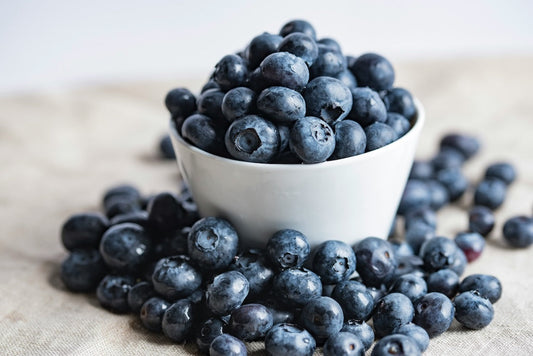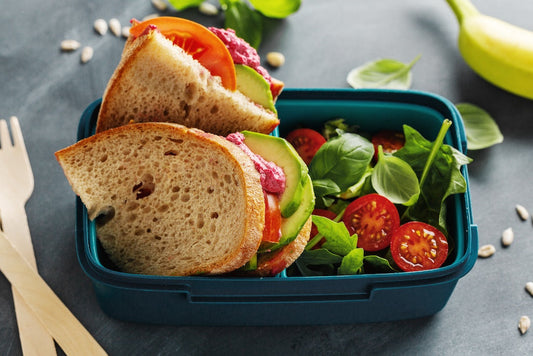Oat bran is a powerful food with a huge impact on your health. In this post, we will explore the world of carbohydrates in relation to oat bran and shed light on their special significance in your diet. You will also understand why carbohydrates are a crucial aspect of our nutrition.
Per 100 grams, oat bran provides about 331 kilocalories and 55 grams of carbohydrates. But what exactly are carbohydrates and why are they important?
All about the superfood oat bran
What is oat bran and why is it important for your health?
Oat bran consists of the seedling and the outer layers of the oat grain and contains a wealth of nutrients and dietary fiber. It is a true superfood that has received increasing attention due to its high content of soluble fiber, especially beta-glucan.
Oat bran can help lower cholesterol, stabilize blood sugar levels, support the gastrointestinal tract, and even help you lose weight. Its versatile use in the kitchen makes it an interesting food for you if you want to do something good for yourself. Learn more about the benefits of oat bran on cholesterol.
Oat bran and cholesterol – read more!
Why carbohydrates are an important aspect of our diet
Carbohydrates are one of the basic macronutrients our body needs to produce energy and maintain important functions. They are the preferred energy source of our brain and muscles.
Carbohydrates from dietary fiber, such as those found in oat bran, are particularly important as they promote digestion, increase satiety and support stable blood sugar levels. A balanced diet should include carbohydrates in appropriate amounts to ensure health and well-being.
What are carbohydrates?
Carbohydrates are essential macronutrients found in many foods. They are made up of carbon, hydrogen and oxygen. Carbohydrates are an important source of energy for the body.
Simple carbohydrates
Simple carbohydrates are carbohydrates that consist of only one or two sugar building blocks. Examples of foods with simple carbohydrates are sugar, sweets and soft drinks.
Consuming simple carbohydrates can lead to rapid fluctuations in blood sugar levels and can affect health in the long term. It is important to limit the consumption of simple carbohydrates to avoid cravings and problems with cholesterol levels.
Complex carbohydrates
In contrast, complex carbohydrates are made up of long chains of sugar building blocks. These are found in foods such as oats and bran. Complex carbohydrates are high in soluble fiber, particularly beta-glucan, making them an excellent choice for a healthy diet.
Beta-glucan can positively influence cholesterol levels and build and support the gut flora. Oats, which are rich in complex carbohydrates and fiber, are an excellent example of a healthy food that provides the daily requirement of important nutrients such as manganese, folic acid and B vitamins. They help to maintain stable blood sugar levels and prevent cravings.
Health benefits of complex carbohydrates
Complex carbohydrates are extremely beneficial for your health for a number of reasons:
They promote digestion and prevent constipation:
Complex carbohydrates, found in foods such as oatmeal and bran, are high in soluble fiber. These fibers support healthy bowel function and promote digestion, thus avoiding constipation.
Beneficial effect on cholesterol and blood sugar levels:
A diet rich in complex carbohydrates can help lower cholesterol and keep blood sugar levels stable. In particular, the beta-glucan found in oats has been shown to have positive effects on cholesterol levels.
An important part of a healthy diet: Complex carbohydrates are an essential part of a balanced diet. They not only provide long-lasting energy, but also supply the body with important nutrients such as manganese, folic acid and B vitamins. In addition, they help to increase stool volume and support bowel health.
How can you fit complex carbohydrates into your daily routine?
Healthy breakfast with oat bran
The purpose of a healthy breakfast is to give you plenty of energy for the day. To do this as effectively as possible, a healthy breakfast should consist of carbohydrates, protein, fat, vitamins and minerals. However, it is also important to choose the right source of energy. Oats in a variety of forms, such as oat flakes or oat bran, are healthy.
You can get energy in the form of carbohydrates from cornflakes, a slice of bread and jam, or a chocolate croissant, but you can hardly call that a healthy breakfast.
Because as quickly as your energy rises, it sinks just as quickly and you will soon be hungry again and need a refill. Sugar should therefore be avoided in a healthy breakfast.
It is therefore advisable to avoid simple carbohydrates and choose complex carbohydrates instead.
Instead of crunchy muesli with sugar, sweet spreads and white pastries in the morning, you should instead put the following foods on your breakfast table:
Superfood oat bran and oats.
Oat bran and oats are the ideal basis for a healthy breakfast, because they not only have many health benefits, but are also versatile – in porridge, muesli, crispy muesli, smoothies, as a base for fluffy pancakes, etc.
One of the many advantages of these oat products is that they are considered to be very filling due to their antioxidants and lots of fiber. This makes them perfect for a healthy breakfast. Plus, they are very easy to prepare.
Oats are also a secret ingredient for people with type 2 diabetes. The beta-glucans they contain prevent a sharp increase in blood sugar levels.
Depending on your preference, oat bran and oats are a wonderfully healthy base for your muesli, or you can boil them in water, milk or plant-based drinks to make a delicious porridge. You can also add yoghurt.
Top it off with fresh fruit or seeds and you have a balanced and, above all, healthy oat-based breakfast every day. These oat products are also allowed on a moderate low-carb diet and you can consume them with every meal. What is the difference between oat bran and oat flakes?
Difference between oat bran and oat flakes - all the details!
Healthy carbohydrates and Verival
Verival offers a wide range of products to help you prepare your muesli, porridge or granola quickly. They are easy to prepare and ready in no time.
Here are a few selected examples from our extensive range:
- Bircher porridge
- Strawberry-chia porridge
- Blueberry-apple porridge
- Bircher wholegrain muesli
- Oat Crunchy
- Matcha Porridge Date-Banana
This is just a small selection of Verival's nutritious carbohydrate suppliers. For more information and choice, take a look at our Verival breakfast products.
Discover breakfast products now!
Conclusion
Oat bran is a versatile superfood that has a great impact on health. This post has highlighted the importance of carbohydrates in relation to oat bran and emphasized why carbohydrates are a crucial part of our diet.
Consciously choosing healthy carbohydrates, especially from oat bran and oatmeal, can help to optimize your diet plan in a simple way and benefit from the health advantages of complex carbohydrates.
Frequently asked questions
Is oat bran low carb?
Oat bran does contain carbohydrates, so it is not carb-free. However, the carbohydrates in oat bran are primarily complex carbohydrates and fiber. It can be incorporated in moderate amounts into a low-carb diet, especially if you're watching your overall carb intake.
Is oat bran a carbohydrate?
Yes, oat bran contains carbohydrates. These are mostly complex carbohydrates, specifically dietary fiber. However, the carbohydrates in oat bran are healthier and have a lower impact on your blood sugar levels compared to simple carbohydrates.
Which is better for weight loss, oatmeal or oat bran?
Oat bran is often considered more beneficial for weight loss than oatmeal. This is because oat bran has a higher fiber content and fewer calories per serving. The fiber in oat bran can help increase your satiety and reduce cravings, which is helpful for weight loss.
Does oat bran have fewer calories than oatmeal?
Yes, oat bran typically has fewer calories per serving than oatmeal. This is because oat bran consists of the outer layers of the oat grain, which contain fewer calories. If you're watching your calories, swapping out oatmeal for oat bran in your diet can be beneficial.
Which is healthier, oatmeal or oat bran?
Both have their health benefits and the choice between oats and oat bran depends on your individual nutritional goals. Oats are a good source of fiber and nutrients, while oat bran has an even higher fiber content per serving. If you want to increase your fiber intake, oat bran is the better choice. For a balanced diet, you can alternate between the two. Both are important for your overall cardiovascular health.
How many carbohydrates are in 100 grams of oat bran?
100 grams of oat bran contains about 55 grams of carbohydrates. Of that, 1.3 grams is sugar.
Which has more carbohydrates, oat bran or oatmeal?
While oat bran contains about 55 grams of carbohydrates per 100 grams, oat flakes usually have about 59 grams of carbohydrates per 100 grams.
Is oat bran suitable for low carb?
Oat bran is relatively high in carbohydrates and therefore may not be the best choice for a strict low-carb diet. The fiber contained in oat bran is extremely healthy and for all moderate low-carb forms that do not categorically exclude grains, oat bran also fits into the diet plan.
How much oat bran can you eat in a day?
The recommended daily amount of oat bran can vary depending on your individual nutritional needs. It is often recommended to consume about 30 to 40 grams of oat bran per day. If you are unsure or have specific health concerns, it is important to talk to your doctor.
Can you eat oat bran every day?
Yes, many people successfully incorporate oat bran into their daily diet. It is an excellent source of fiber and can help to promote digestion and regulate cholesterol levels (especially by lowering bad LDL cholesterol). However, it is important to keep an eye on the amount and make sure it fits with your overall eating plan. It is especially important to ensure you are getting enough fluids when consuming oat bran.
What are the nutritional values of oat bran?
100 g of oat bran contain: 330 energy (kcal). 15.1 grams of protein. 8.6 grams of fat. of which saturated fatty acids 1.3 grams. of which unsaturated fatty acids 5.4 grams. 55 grams of carbohydrates. of which sugars 1.3 grams. 16.1 grams of fiber, of which 6.3 grams are beta-glucan (soluble fiber beta-glucan). Oat bran not only has an excellent content of macronutrients, but also scores in the area of micronutrients and trace elements. Oat bran is rich in iron, zinc, phosphorus and vitamin B1.
























